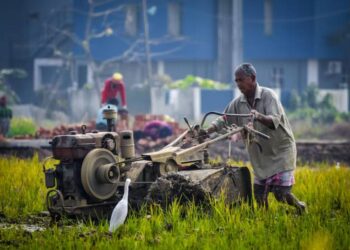Eagle Pass, Texas: A recent visit to Eagle Pass, Texas, has exposed a harrowing reality at the southern border. Observers witnessed individuals crossing into the United States without any resistance, highlighting a severe breach in border security. This situation, coupled with a growing humanitarian crisis, signifies a breakdown of law and order, which many perceive as an invasion of the country.
Local officials recounted that in 2019, the border was secure, and such issues were virtually non-existent. They believe that with the cooperation and support of the federal government, the border could be secured once again. However, they lament the lack of support from the current administration, which they claim is essential for restoring order.
The situation at the southern border is being framed as a national security battle, not with foreign adversaries like Russia or China, but with the influx of undocumented migrants. Critics argue that the Biden administration, along with large non-governmental organizations (NGOs), is facilitating this crisis by promoting policies that undermine border security.
The term “regular migration” is being criticized as a euphemism for open borders, a concept supported by international organizations and allegedly promoted by the current administration. This has led to accusations that the government is prioritizing political agendas over national security.
Texas Lieutenant Governor Dan Patrick has announced plans to start arresting illegal migrants in an effort to curb the crisis. The demographic of concern is single adult males, who are reportedly the fastest-growing group of migrants. This has led to suspicions of a coordinated effort by hostile foreign nations to infiltrate the country.
The administration’s response, or lack thereof, is being compared to the appeasement policies of Neville Chamberlain before World War II. This perceived inaction has sparked outrage, especially in light of recent legal battles. For instance, the Biden administration fought against Texas’ S.B. 4, a law that empowers state authorities to arrest and prosecute individuals suspected of illegal border crossings.
Even within the administration, there are voices of concern. FBI Director Christopher Wray has warned Congress about the dangerous individuals crossing the border. In his testimony, Wray highlighted the threat of drug trafficking and the potential for an imminent terrorist attack due to inadequate screening processes.
This internal dissent has not gone unnoticed. A group of 15 House Democrats has petitioned the administration to take more decisive action to secure the border, but their pleas have so far been ignored.
Conservatives argue that the American people must take matters into their own hands. Public support for a strong and secure border is seen as the last hope for meaningful action. Polling data indicates that border security is a top concern for voters, with many considering it a bigger issue than inflation, crime, or unemployment.
A recent poll reveals that nearly one-third of Americans believe shutting down the southern border is the best way to deter illegal immigration. This sentiment has grown over the past year, with an increasing number of Americans supporting mass deportations of undocumented migrants.
The humanitarian crisis at the border is another critical aspect of this complex issue. Many of the individuals crossing the border are doing so out of desperation, fleeing violence, poverty, and persecution in their home countries. This has led to overcrowded detention centers, inadequate living conditions, and significant challenges in providing necessary medical care and support.
Advocates for more compassionate immigration policies argue that the United States has a moral obligation to help these individuals. They call for comprehensive immigration reform that balances security with humanitarian considerations, ensuring that those in need can find safety while maintaining the integrity of the border.
The economic impact of the border crisis is also a point of contention. On one hand, undocumented migrants are often willing to work in low-wage jobs that many Americans are unwilling to take. This can benefit industries such as agriculture, construction, and hospitality, which rely heavily on migrant labor.
On the other hand, critics argue that the influx of undocumented migrants drives down wages, increases competition for jobs, and strains public resources. They contend that a secure border is necessary to protect American workers and ensure fair wages and opportunities for all citizens.
The legal landscape surrounding immigration is complex and fraught with challenges. State and federal governments often find themselves at odds over how to handle the crisis. While states like Texas push for stricter enforcement and the ability to take matters into their own hands, the federal government maintains that immigration policy falls under its jurisdiction.
This tension has led to numerous legal battles, with courts frequently having to weigh in on contentious issues. The recent ruling on Texas’ S.B. 4 is just one example of the ongoing struggle to find a balance between state autonomy and federal oversight.
The border crisis has significant political implications, influencing elections and shaping public opinion. Candidates who take a hardline stance on border security often find substantial support among voters who prioritize this issue. As the crisis continues to unfold, it will undoubtedly play a crucial role in upcoming elections at both the state and national levels.
Public opinion polls consistently show that a majority of Americans are concerned about border security and illegal immigration. This sentiment crosses party lines, with many Democrats and Republicans alike calling for more robust measures to address the crisis.
The border crisis also affects the United States’ relationships with neighboring countries, particularly Mexico and the nations of Central America. Cooperation with these countries is essential for managing migration flows and addressing the root causes of migration, such as violence, corruption, and economic instability.
Diplomatic efforts to strengthen partnerships and develop comprehensive strategies for regional stability are crucial. However, these efforts must be balanced with the need to maintain a secure and orderly border.
Advancements in technology offer potential solutions to enhance border security. From surveillance drones and advanced sensors to biometric screening and data analytics, modern technology can provide more efficient and effective ways to monitor and manage the border.
Investing in these technologies could help reduce the need for physical barriers and provide a more nuanced approach to border security. However, it is essential to ensure that the implementation of these technologies respects civil liberties and privacy rights.
The communities along the southern border are directly affected by the crisis. These areas often bear the brunt of the challenges associated with illegal immigration, including increased crime, strained public services, and economic disruptions.
Local officials and residents have voiced their concerns and called for more support from the federal government. Their perspectives and experiences are critical in understanding the full impact of the border crisis and developing effective solutions.
As the border crisis continues to escalate, it is imperative for the American people to stay informed and engaged. Supporting candidates who prioritize border security and advocating for comprehensive immigration reform are essential steps toward resolving this complex issue.
The situation at the southern border is not just a humanitarian challenge but a significant national security threat. Through collective action and a balanced approach, it is possible to secure the border, protect the nation’s interests, and address the needs of those seeking a better life.
The southern border crisis is a multifaceted issue that requires immediate attention and action. By staying informed, supporting effective policies, and working together, Americans can help ensure the security and prosperity of the nation.







